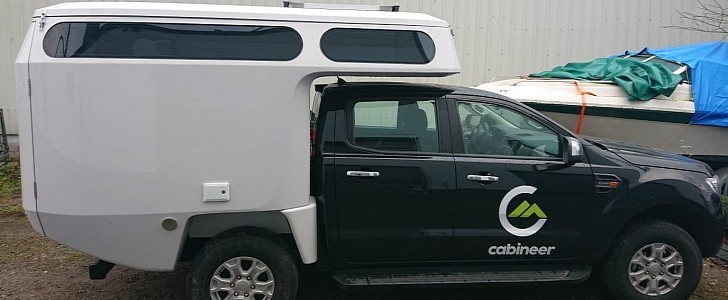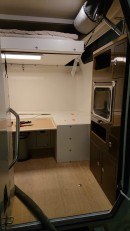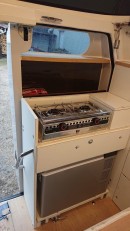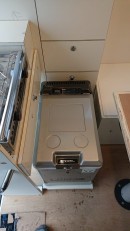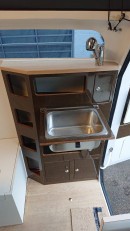A German couple went from taking road trips in the U.S. in a converted Land Rover Defender to designing and building a truck camper that’s not just versatile but also innovative in terms of sustainability and the materials that are used to bring it to life.
After observing the good and the bad of truck campers during a two-year-long trip on the Pan-American Highway, a German couple designed its own version with two main directions in mind – flexibility and sustainability. The first goal was accomplished by equipping the cabin with a fridge that’s accessible from the outside as well, a mobile stove with a cooking station, and a storage cabinet that can also be accessed from the outside.
Called the Cabineer, this truck camper can sleep three adults or two adults and two kids and can be fitted on most pick-up trucks. It also incorporates a seating area for four people, a shower, and a toilet, so it’s ready for outdoor adventures. But perhaps its most innovative feature is the use of sustainable materials.
The Cabineer is made of NFC, a natural fiber-reinforced plastic. Although plastic could not be completely eliminated from the construction process, the brand says that the materials it uses produce 80% CO2 than conventional GFRP (glass fiber reinforced polymer). These materials are flax fibers and an epoxy resin derived from linseed oil.
These natural fibers are lighter than fiberglass but still firm and highly resistant. Less energy is required to obtain these fibers (which are a byproduct of linen production) compared to conventional fiberglass, and when they burn, they are also almost residue-free, which means that they are sustainable at the end of their lifecycle too.
Both the NFC and the cork that’s used as insulation are sourced from Europe, and the Cabineer is made locally in Kiel, Germany. The overall sustainable concept is an interesting approach that could inspire U.S. –based truck camper builders as well. For now, the Cabineer is available for order, with pricing starting at €45,000 ($49,000). This is just the beginning of the journey, as the German company intends to speed up production time in the future and maybe also introduce a demountable version.
Called the Cabineer, this truck camper can sleep three adults or two adults and two kids and can be fitted on most pick-up trucks. It also incorporates a seating area for four people, a shower, and a toilet, so it’s ready for outdoor adventures. But perhaps its most innovative feature is the use of sustainable materials.
The Cabineer is made of NFC, a natural fiber-reinforced plastic. Although plastic could not be completely eliminated from the construction process, the brand says that the materials it uses produce 80% CO2 than conventional GFRP (glass fiber reinforced polymer). These materials are flax fibers and an epoxy resin derived from linseed oil.
These natural fibers are lighter than fiberglass but still firm and highly resistant. Less energy is required to obtain these fibers (which are a byproduct of linen production) compared to conventional fiberglass, and when they burn, they are also almost residue-free, which means that they are sustainable at the end of their lifecycle too.
Both the NFC and the cork that’s used as insulation are sourced from Europe, and the Cabineer is made locally in Kiel, Germany. The overall sustainable concept is an interesting approach that could inspire U.S. –based truck camper builders as well. For now, the Cabineer is available for order, with pricing starting at €45,000 ($49,000). This is just the beginning of the journey, as the German company intends to speed up production time in the future and maybe also introduce a demountable version.
